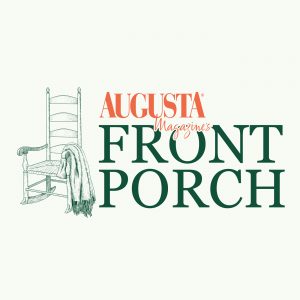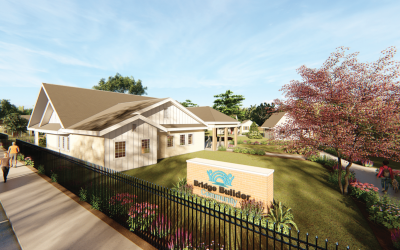Each year, for one week in April, the world descends on Augusta. Visitors come from Dubai and Des Moines, Sydney and Savannah, making a pilgrimage to one of the treasured places in sports.
They come to sample the pimento cheese sandwiches, nostalgically wrapped in green-tinted cellophane, and to toast once-in-a-lifetime memories in the crowded restaurants and bars that line Broad Street, fill Surrey Center and stretch across the city. During Masters Week, all eyes are on Augusta as the epicenter of the golf universe.
Yet, the impact of the golf industry in the community doesn’t end when the Green Jacket is slipped over the winner’s shoulders in the fading daylight on that spring Sunday. Instead, that next morning, in the wake of so many leaving town, countless residents will make their way to Club Car® and E-Z-GO® to continue their work powering a critical sector of the golf world.
For more than 50 years, Augusta has been home to two of the largest manufacturers of golf carts in the U.S. When you factor in Yamaha, which is based in the Atlanta area, more than 85 percent of the nation’s golf cart business is concentrated in the state of Georgia.
“Your top competitor is very close to you, and you’d see them in the community, and you’d see them in the boardroom,” says Fred Palmer, vice president of Club Car’s golf business vertical. “It made for an interesting dynamic that probably was very similar to Detroit in a way. The ‘big three’ automakers were all there, and it was the ‘big two’ in Augusta.”
And it all started with two visionary brothers.

The Roots of Rivalry
E-Z-GO was founded in 1954 by Billy and Bev Dolan, who had a mind for business and were equally adept at working with their hands.
In a small machine shop near downtown Augusta, the duo, inspired by seeing then-Augusta National Chairman Bobby Jones driving around the course at the 1954 Masters on a three-wheeled cart, began building the company’s first golf carts by hand, relying on wing-flap motors from outdated B17 bombers used in World War II to get started.
“I think that’s a point of pride for all of us that the industry really traces its roots here,” says Brandon Haddock, director of communications for Textron, who owns E-Z-GO.
“The first golf carts weren’t built in Augusta, but the Dolan brothers were the ones who really cracked the code on building a golf car efficiently at a fleet scale where it became more than a novelty. A golf course may have had one or two before, but now they could buy a fleet of golf cars that every golfer could go out and use on the course.”
From that small shop on Greene Street, the brothers perfected the process of how to mass produce golf carts and transformed it into the multi-billion dollar industry it represents today.
For instance, golf course design used to be limited by geographic boundaries with consideration given to how long a walk would be from the green to the next tee. The advent of the golf cart provided a more efficient way for golfers to get around the course, contributing to more innovative design trends that incorporated natural topography and lengthened holes to create more scenic and challenging environments.
E-Z-GO ultimately relocated the company’s operations to its present location on Marvin Griffin Road. Now a unit of Textron Specialized Vehicles, it employs more than 1,000 people in Augusta and is the oldest golf cart brand in the industry.
Not to be outdone, Club Car staked its flag in the community after Bill Stevens purchased Landreath Machine and relocated that company’s operations from Houston to Augusta in 1962. In Texas, Landreath focused on hand trucks that were trusted by movers and delivery services. Upon arrival in Augusta, the company pivoted to golf carts.
Stevens also appreciated the value of a promotional gimmick and celebrated the launch of this new brand with an admittedly slow journey on a Club Car golf cart from the Garden City all the way down to Dunedin, Fla., to introduce the company at the PGA Merchandise Show.
In all, the trip took five days but captured the industry’s attention and cemented Club Car’s place as a top competitor to its local counterpart. Additionally, under Stevens’s leadership, Club Car released the first golf cart featuring a traditional steering wheel, forever displacing the hand lever system that one typically only finds on lawnmowers these days.
An Industry Rises Among Community Rifts
Every rivalry story needs a little bit of drama, and have no fear, these two titans of fairway mobility have theirs. The Dolans helped to build E-Z-GO into a national leader in golf cart manufacturing, ultimately selling the company to Textron in the 1960s to pave the way for a sustained period of growth and expansion.
Per several published reports and personal accounts, Textron invested in Bev, recognizing his natural business acumen and leadership instincts, slowly pushing him up the corporate ladder until he became the company’s corporate president in the late 1970s.
During his ascension, he hired a new president to oversee E-Z-GO, which led to some philosophical friction between Billy, deemed a creative genius by his brother, and other existing executives. As such, this group turned their eyes and interests across town.
Billy teamed up with seven other executives from E-Z-GO to purchase Club Car from the Johns Manville Company, which had acquired the company from the Stevens family. This new ownership group focused on growing Club Car through design innovation, positioning it as the counterweight in the market to its crosstown rival.
Known as “The Original Eight” in many Augusta circles, they used the experience and expertise accumulated during their time at E-Z-GO to help push Club Car toward the top of the industry.
What resulted was a decades-long, at times intense rivalry between the two heavyweights in the golf vehicle space that had ramifications locally.
“You had these two brothers that worked together and then separated, and that didn’t make for really good holiday gatherings I would think,” Palmer says. “In the early days, it was hypercompetitive because of some of those guys leaving and buying Club Car. They took a huge risk. I wouldn’t be here today if it wasn’t for those guys getting second mortgages and doing whatever they had to do to buy the company.”

Scott Michaux, a longtime columnist for The Augusta Chronicle and writer for several golf publications, including Global Golf Post, noted that former Augusta Mayor Bob Young got caught up in the excitement of Club Car, based in Columbia County, releasing its one-millionth car in 2001 by exclaiming “Take that, E-Z-GO!” The in-the-moment statement didn’t land well among his constituents in Richmond County where E-Z-GO is located.
In the same way, the Cola Wars of the 1980s and 1990s divided fans of Coke and Pepsi, employees from Club Car and E-Z-GO famously refused to even casually mingle for years with whole families taking sides with one company or the other.
Each Masters Week, the streets of Augusta would be famously lined with golf carts, and attention often was paid to which particular brand was situated in front of a certain store.
A Legacy Evolves
There’s no mistaking the influence and impact Club Car and E-Z-GO have had on the Augusta community, combining to employ thousands of local residents and make a lasting economic impact each year. The city has long been a manufacturing hub for the Southeast, owing its connection to the railroads and proximity to the Savannah River.
From its days as the home of a key powder mill during the American Civil War to the influence of the Savannah River Site today, science-driven manufacturing has powered the local economy in some form or fashion.
Those roots have just as much to do with the rationale for why Augusta can call these two companies their own as does the fact that once a year it plays host to golf’s most prestigious tournament. That base of knowledge has enabled these two companies to position themselves as cutting-edge leaders in a competitive industry, using their own rivalry to drive innovation forward in a way that has benefitted the broader community.
Yet, perhaps there is a simpler explanation for why Augusta has emerged as the global leader in golf car manufacturing. “I think at the end of the day it boiled down to the fact that the Dolan brothers were from here,” Haddock says. “This was home so this is where they were going to start it. I never heard anybody say exactly why, but that to me is the most natural reason. “This was just home for them.”

Seen in the April 2024 issue of Augusta magazine.






